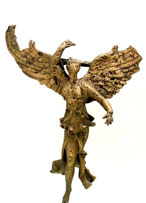| Author | |
|---|---|
| Epoch | XII-XIII |
| Work | The Man in the Panther Skin (Shota Rustaveli, The Man in the Panther Skin, Text and Versions, Edited by Akaki Shanidze and Alexandre Baramidze, Tbilisi, 1966) |
| Type | |
| Quote | “You insulted me and made me angry, for a long time I could not reassure my soul;” […] (Stanza 816, 3) “The men of science have truly said that an insult is a net of woes.” (Stanza 817, 2) |
| Term |

| Comment | In the works of many philosophers of antiquity, it is possible to reveal the arguments and winged words about the need to give up insult, i.e. resentment; on the need to refrain from anger, i.e. wrath. In “the men of science", mentioned by Rustaveli, presumably, first of all, we can recognize Aristotle and Plato. However, in this particular case, I think that the immediate source of the reception for Rustaveli was Homer's “Iliad”, which in other words is also called "the poem of wrath"; because we can say that the entire “Iliad” portrays anger, namely the wrath of Achilles, which is the central motif of the whole poem. That is why it is said in the very first lines of the prooemium, that is, the prologue of the poem that the only result of anger can be countless ills: “Sing, O goddess, the destructive wrath of Achilles, son of Peleus, which brought countless woes upon the Achaeans” (Iliad, I, 1-2; cf. Iliad, XIX). Thus, according to Homer (Iliad, I, 1-2), it is the wrath, more simply told, the anger, which causes "countless woes"; meanwhile, Rustaveli mentions (817, 2) not wrath or anger, but resentment, insult, as a main reason of "woes". However, the discrepancy is only apparent, because from previous stanza (816, 3) it becomes clear that, according to Rustaveli, the wrath / anger is itself caused by resentment, insult, which leads me to believe that 817, 2 is an allusion to the theme of anger from “The Iliad” (for details, as much as other arguments see Z. Khintibidze, A Literary Source for Rustaveli: Circe’s Episode and Wrath Theme in Homeric Epic, Proceedings of the Fifth International Symposium on Kartvelian Studies, Tbilisi, Kartvelologist, 2011, pg. 267-278, especially, pg. 273-278. - In Georgian). [Z.Kh.] |
|---|

